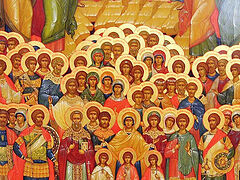St. Clement of Ohrid (†916), the disciple and co-struggler of the enlighteners of the Slavs Sts. Cyril and Methodius, labored greatly together with them in the field of Slavic enlightenment and defense of Orthodoxy in the Moravian land. Exiled from there, he came to Bulgaria, where he organized numerous schools in which Slavonic literacy was taught to both children and adults. A translator, preacher, and spiritual writer, he became the first bishop to serve in the Slavonic language, and his literary works were the first examples of Slavic spiritual literature.
The Church commemorates the bishop of Ohrid, Clement, together with is co-laborers—Sts. Angelar, Naum, Savva, and Gorazd. Today on the Sunday of All Saints we present a few of his teachings on the veneration of saints.
 Holy Hierarch Clement of Ohrid
Holy Hierarch Clement of Ohrid
O Lord, bless!
Know, brothers, that today is the feast of Saint [name]. And we need to gather in church for prayer, as it says in the Holy Gospel: Where two or three are gathered together in my name, there am I in the midst of them (Matt. 18:20). Here, brothers, amidst the worshippers, is the Lord Himself, in accordance with His promise. Therefore it is needful for us to go to Church with a pure heart, that we may pray without anger and wrath, first of all asking for cleansing of all sins. For it is said: all things, whatsoever ye shall ask in prayer, believing, ye shall receive (Matt. 21:22). And, when ye pray, use not vain repetitions, as the heathen do: for they think that they shall be heard for their much speaking (Matt. 6:7). This is idle talk, when from God people seek riches, honor, victory over an enemy, or something earthly. But seek ye first the kingdom of God, and his righteousness; and all these things shall be added unto you (Matt. 6:33).
And when you celebrate the memory of the saints, you do this: First of all, let us emulate their purity, their good life, and faithful service. Pleasing to God is he who unhypocritically celebrates the [Church] feasts, and not as the man-pleasers, who expect to receive praise for the table [he’s laid]. It is better for us to emulate the saints in their actions. And let us always be attentive that our souls be pure, and our hearts holy. These are the feasts that God wants: when we receive wanderers, feed the hungry, clothe the naked, visit prisoners with alms; when we give some help to the poor and sick; when we somehow help the offended, when we honor each other without hypocrisy, but with humility and sincere love. Thus did God say: According to your faith be it unto you (Matt. 9:29). Then our prayers will be accepted— prayer united with acts of mercy will truly be heard. Such sacrifices, as the apostle Paul said, are pleasing to God (cf. Heb. 13:16). And the prophet [David] said, A sacrifice unto God is a contrite spirit: the heart that is broken and humbled, God with not despise (Ps. 50:19). And the Lord says the words: For I desire mercy, and not sacrifice (Hos. 6:6).
Brothers, having heard this, write it all in your hearts, for we need to always learn from these [words] and [in the proper manner] honor the feasts of those who pleased God. Therefor did God give power in heaven and on earth to forgive sins, and through them He gives healing to those who worthily honor Him. Worthily honoring their lives and sufferings, let us ourselves labor to work a good struggle and preserve the right faith. Let us always abide in God’s commandments and let us learn from them. Let us render to God’s Church due glory: We will pray for forgiveness of sins [in it] with fear, and not only refrain from idle talk, but also cast out evil thoughts from our hearts, and penetrate the reading and hymns. And let us glorify with pure lips the Most Holy Trinity: Father, Son, and Holy Spirit, always, now and ever, and unto the ages of ages. Amen.



